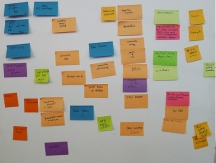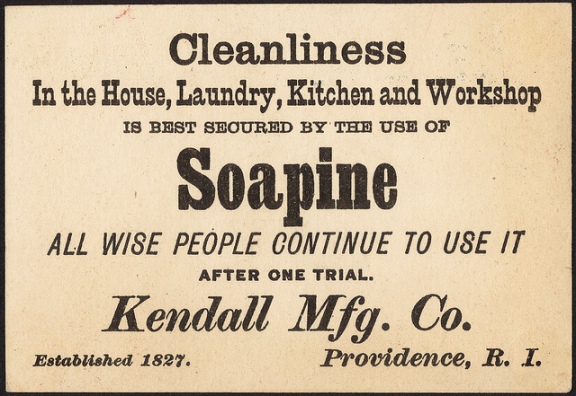If you want to get better at anything — playing the violin, swimming, building scale models of historic buildings from sticks of gum — you need feedback on your work. Blogging is no different; feedback on writing, photography, or blogger skills like layouts and editorial calendars helps you improve those elements. There’s a reason people studying writing and photography “workshop” their stuff.
Is it hard to open your creative output to direct, potentially not-so-glowing feedback? Heck yes! But you learn, and you get better. Why not try an informal blogging workshop? You’ll get helpful insight into your work and make some great connections along the way.
This isn’t Santa’s Workshop, this is BLOGGING!

My favorite writing workshops involve the gratuitous use of post-it notes, but your mileage may vary. (Photo by jaycross, CC BY 2.0.)
First things first: what does it mean to “workshop” something? Basically:
- You write something.
- When you think it’s ready, or you want help with something you’re struggling with, you share it with a small group of other writers.
- They read it and give you candid, respectful feedback.
- You discuss the feedback openly, and toss ideas around.
- You revise, it gets better, and you publish it.
If it seems a little scary, remember: you already publish your thoughts for the world to consume, and let anyone comment on them. If you can do that, you can do this. The Editorial Team here at WordPress.com does it every day — everything we write is posted for the team for review before it’s published, and it makes us all better for it.
Pick your workshop flavor
So how do you actually workshop your stuff, if you’re not already part of a group in real life? You do it the way you do so many other things: on the internet.
- To get your feet wet, try something like the Community Pool here on The Daily Post. It’s filled with bloggers just like you who take the time to review your stuff and offer detailed, helpful reviews. It’s informal, doesn’t take much time, and is a great way to connect with other bloggers who care about their crafts.
- Go bigger at sites built around mutual support and feedback like Scribophile. You can post your work for review, review others’ material, and chat with other writers in their forums; they’ll also give you a crash course in how to review and offer feedback effectively. If the Community Pool is the vanilla of workshops, this is the Rocky Road.
- Become a full-on workshopper by building your own small group of bloggers. It’s the most intensive option, but it also gives you a trusted group of critics who are able to see your work as it evolves. Think of it as the banana split of workshops, with an extra cherry.

The Daily Post can neither confirm nor deny the efficacy of Soapine in keeping your workshop clean. Maybe just watch your language. (Photo by the Boston Public Library, CC BY 2.0.)
I’ll take chocolate; now what?
Once you’ve got a group, you have options for how you want organize things.
First, you’ve got to share your drafts. The simplest way is with email, either in the body of a message, or as an attachment. A step up from that are tools like Editorially, which keeps everything conveniently web-based and accessible for anyone with an internet connection. If you know and trust the bloggers you’re working with, you can also consider adding them to your blog as users so they can access previews of your posts — make them “Contributors,” and they’ll be able to see your drafts but not edit, publish, or take any other action on your blog.
Second, you have to talk. Again, there are lots of ways to do this online, with different time and energy commitments:
- Circulate comments via email. If you’ve got a blog, you’ve got an email address, so you’re all set. It also lets you write and respond on your own time.
- Start a private blog; a blog lets everyone see the discussion and respond when they can, and threaded comments make it easier to see who’s responding to that (which often gets messy in a long email chain). The P2 theme is perfect for this — in fact, that’s how we do all our collaborating at WordPress.com
- If you use a tool like Editorially, group members can leave comments, notes, and edits in your drafts while preserving your original version.
- Try the WordPress.com feedback tool to keep everything centralized on your blog. Send a feedback request and secret link to your draft to anyone, and let the comments accumulate right in your dashboard.
- With a tool like Skype, you can chat in real time either via voice, or in text. Circulate your drafts, and schedule a chat time where you can all sit down and hash out that tricky plot hole.
Ready to workshop? Let’s do it
To make it easy, go ahead and use this comment thread to get organized. Here’s our suggestion:
- If you want to create a workshopping group, post a comment indicating what you’d like to work on (writing, photography/visual art, or blog design and tools).
- To join a workshop, comment on someone’s reply.
- Once a workshop request has four or five comments, consider it closed — move to the next one, or post your own request.
- The blogger who posted the original request takes responsibility for contacting the other group members.
To make it easy to contact and be contacted, ensure that your blog has a contact method like an email address, or a contact form. After that, you’re on your own. Continue the conversation via email, start a P2-themed private blog, or open a forum thread to share ideas — that’s why the Ideas Forum is there, after all — and figure out how you want to organize yourselves. How much and how often you communicate it up to the group.
If anyone has other online resources they find helpful, please share!
Currently blogless? You’re a click away from sharing your story.
Create your blog at WordPress.com
Michelle,
I attempted to bring you into our discussion above, but not sure how to reference you. We seem to have our group together. Based on our comments, do you have a suggestion/(preference) for us when working together? P2 or Editorally??
Realize that’s sort of a broad question. I’m at rpsandbag (at) gmail if you’d like to (and can) email me.
Thanks so much!
Ramona
LikeLike
@threadtime, I’d try a P2 — it’s a better vehicle for discussing/sussing things out/getting to know one another. Editorially is more strictly write + leave comments, so it sounds like the flexibility of a P2 will work well for y’all. So glad you’ve gotten a group together!
LikeLike
Thanks for the quick reply. Yes, I’m glad y’all offer these sorts of tips. Great way to make connections with others wanting to improve their blog. Thanks so much, Ramona
LikeLike
@sousetoiles, make sure you reply directly to the comment you’re referencing so that we can all keep track of the discussion.
LikeLike
Those of you who have left comments asking for feedback, try replying directly to someone else’s comment — that way, you can start a conversation, and hopefully get a small group together. Check out the first few comments here, where people have done just that.
LikeLike
I’m replying to this really late, but I’d love to get involved with this 🙂 I write (or at least try to write) about Philosophy in a light-hearted manner, from a high school senior’s perspective, and it would be great to get some feedback on my work 🙂 Anyone interested will receive virtual cookies in addition to return-feedback from me.
LikeLike
So everyone is interested in the group, which is so exciting. How do we organize it and who is doing the organizing?
LikeLike
Hello, I started blogging about 4 months ago and I feel like my work is decent, however, its rather different from most. I mean it’s dedicated to Real Life Events that actually happened to me and so forth. I would love if someone could or would analyze my work. I have a cool following when I repost on FB but I want to see if I can run with the big dawgs on this site. Check me out if you can and pass on some constructive criticism. I’m not sure my work even has a tag for it, I just try to get in a zone and go for it, straight with no chaser… So if anyone hears me knocking, let me in…
LikeLike